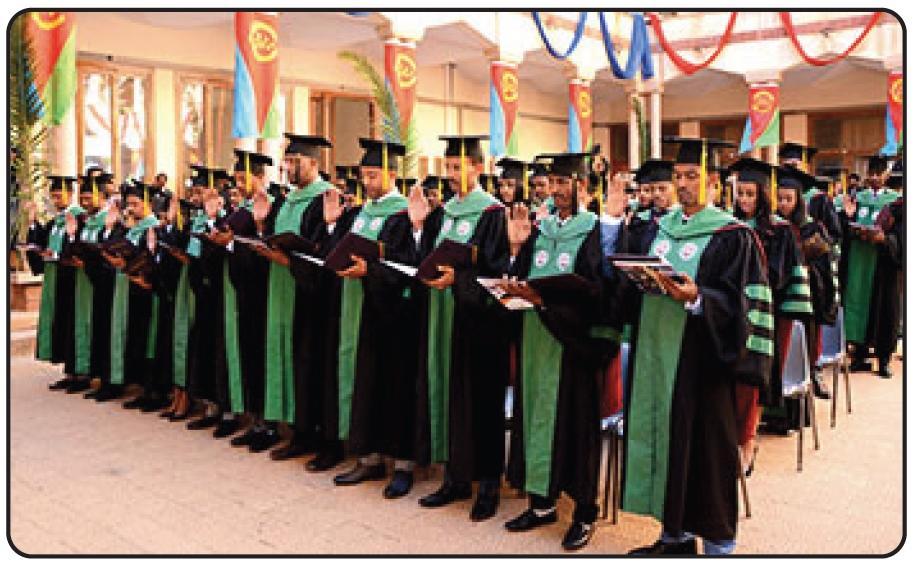Africa-Press – Eritrea. The world marked International Youth Day on 12 August, celebrating the creativity, energy, and leadership of young people everywhere. This year’s theme, calling for meaningful youth engagement in building sustainable and inclusive societies, resonated strongly in Eritrea, where youth have been putting those ideals into practice long before and after the global observance. From rural villages to bustling towns, young Eritreans are planting trees, conserving water, teaching in classrooms, and leading community projects that embody the spirit of the day.
One example came on 3 August in Tesenay sub-zone, where a seminar brought together hundreds of students in the Students’ Summer Work Program. Jointly organized by the National Union of Eritrean Youth and Students (NUEYS) and the Ministry of Education, the event was both a forum for ideas and a rallying call for action. Mr. Meles Gebrai, Head of the NUEYS branch in Tesenay, told participants that their role in national development is indispensable, urging them to take part in greening campaigns, environmental sanitation, and other community initiatives. Students pledged to approach their duties with dedication. This year, about 600 are participating in the program in Tesenay.
Similar work is underway in the Mendefera sub-zone, where students are engaged in soil and water conservation and reforestation. According to Mr. Bereket Tekleselasie, Head of the local Agriculture Office, 250,000 seedlings planted last year in seven areas are thriving. This year, 900 students – guided by teachers and agricultural experts – have planted 28,000 more and built 27 km of terraces.
Beyond their immediate contributions, these programs help instil values of civic responsibility, cooperation, and environmental stewardship in young participants. The skills and habits developed – teamwork, problem-solving, and a sense of community ownership – extend far beyond the summer months. They prepare young Eritreans to become changemakers who can tackle future challenges in agriculture, urban planning, climate resilience, and public health, ensuring that the nation’s development gains are sustained over the long term. A national commitment to youth
International Youth Day, first proposed at the 1991 World Youth Forum in Vienna and officially proclaimed in 1999, is more than a symbolic date on the calendar. It is a reminder that young people are not passive beneficiaries of development programs, but active architects of change. This vision aligns closely with Eritrea’s approach, where youth engagement is deeply woven into national policy. The 1994 National Charter identifies human resources, especially youth, as the nation’s greatest asset, and successive policies have placed their education, health, and empowerment at the centre of development strategies.
Eritrea ratified the Convention on the Rights of the Child soon after independence and later the African Charter on the Rights and Welfare of the Child. Laws strictly prohibit child labour, trafficking, early marriage, and harmful practices such as female genital mutilation/ cutting. Programs for vulnerable children and youth – run by the Ministry of Labour and Social Welfare, civil society organizations, and youth associations like NUEYS and the National Union of Eritrean Women (NUEW) – offer protection, education, and skills training.
These investments have borne fruit. Young teachers work in remote communities, raising literacy rates and building human capital. In health care, young professionals deliver essential services nationwide, improving the health and well-being of Eritrea’s citizens. Graduates contribute to research and innovation in agriculture, engineering, and infrastructure, efforts praised by the former African Development Bank President Akinwumi Adesina for advancing Eritrea’s development.
Notably, Eritrea’s young people have long played a decisive role in shaping the nation’s destiny. During the struggle for independence and the subsequent defence of sovereignty, countless young Eritreans joined the frontlines, served as medics, educators, and logisticians, and supported the liberation effort in both combat and civilian roles. Their courage, resilience, and sacrifices were central to securing freedom and preserving the country’s territorial integrity. This legacy of service and sacrifice continues to inspire today’s generation, linking the spirit of past struggles to the ongoing work of nation-building.
Agents of change and building the nation
Across the world, young people have been at the forefront of social transformation, economic innovation, and political renewal. Their energy, creativity, and willingness to challenge the status quo make them powerful catalysts for progress. In Eritrea, this same spirit is vividly evident, as youth continue to shape the nation’s trajectory through their dedication, resilience, and active participation in every sphere of society.
Eritrean youth are leading environmental stewardship efforts through reforestation, terracing, and water conservation projects that strengthen community resilience. They are challenging outdated norms on gender equality, disability, and mental health, while promoting inclusion and solidarity. In arts, music, sports, and culture, young talents are shaping Eritrea’s creative identity and gaining recognition at home and abroad. And when the nation’s sovereignty has been threatened, they have stood at the front lines with unity, determination, and courage.
The link to International Youth Day is unmistakable: the qualities celebrated globally – innovation, leadership, and service – are demonstrated daily by Eritrea’s youth. Their contributions show that sustainable national development is impossible without their vision and drive. As the world reflects on this year’s Youth Day, Eritrea stands as a vivid example of what is possible when young people are empowered.
For More News And Analysis About Eritrea Follow Africa-Press







